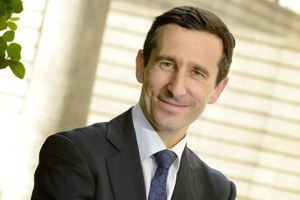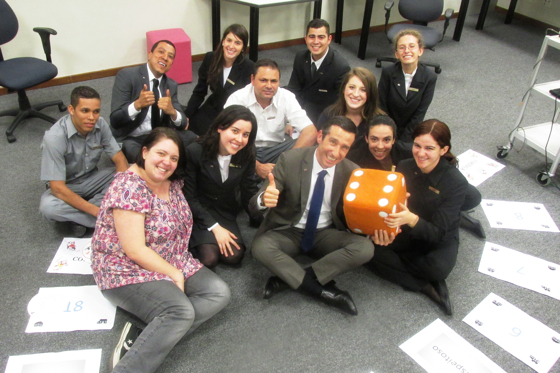
In starting the Sponsor of Love initiative more than a year ago, GM Thierry Guillot and his team at Grand Hyatt São Paulo had lofty goals — namely, to care for guests and each other in a more holistic way and with a higher level of emotion.
Nevertheless, the 466-room property has achieved those goals and more, making concrete changes such as a revised, more personal pre-arrival and check-in process as well as a training “game” for employees and posting measurable results such as improved guest-satisfaction and employee-engagement metrics. The hotel also was honored with Hyatt Hotels Corp.’s second-annual CEO’s Award for Innovation for its empathy-based approach.
HOTELS spoke with Guillot about the origins of Sponsor of Love, its key elements and what he expects the program to achieve going forward.
HOTELS: Why did you begin the Sponsor of Love initiative?
Thierry Guillot: We were part of an initiative from Hyatt to develop innovation and look for ways to develop loyalty with guests. We’re constantly looking for ways to improve the experience of our colleagues and our guests, so we had about 35 to 40 interviews with guests trying to understand what would make them come back to a hotel and make them so loyal they would not even think of going to another property. It was interesting to see a common trait among the answers from guests. We discovered travelers at some times had a feeling of loneliness, and this was a bit of a surprise for us. We decided to develop some answers in that regard.
HOTELS: Talk more about the Sponsor of Love training “game” you are using with your staff.
Guillot: We were trying to make sure our employees were providing personal service, listening more deeply to the need of every single guest. We wanted them to change the conversation they had with guests. It’s hard to do a standard, traditional, PowerPoint training with employees and explain to them to be yourself and be more emotional with guests.
As a matter of fact, we don’t call it training. This game is optional. We usually gather 10 to 15 employees from all departments to have people knowing each other better and understanding that working together would help them in responding to guest needs. There are huge dice, and every time they throw the dice they have a question. An example would be to mention to one of the colleagues in the room one great action you’ve seen them doing in the last two weeks. Another question would be to explain the five attributes that we define in the Sponsor of Love program — respectful, positive, humble, engaged and helpful. We try to have people motivate each other as well as building trust, confidence and transparency. At the end of each session, which is about an hour and a half, I give a 15-minute speech about the initiative and how we expect them to behave, and they are given a pin to be recognized as a Sponsor of Love.

HOTELS: Given that the program is voluntary, approximately how many of your employees have chosen to participate thus far?
Guillot: So far in about eight months of offering the game we have 250 employees of about 600 who have gone through the course. Ideally everyone would participate, but I think if we get to 300 or 350 that would be good.
HOTELS: What would you highlight about other changes you have made in conjunction with this initiative?
Guillot: Every guest will have a different need, so it’s hard to have a strict, rigorous plan to match one need with one action. What we want to have is independence for our colleagues to react to what the guest needs. What we’ve seen is they have become more flexible and independent to take action.
I have a great example. There is a gentleman from the United States who comes here every week, and he had his birthday at the hotel, away from his family. The team initiated calling his family and asked them to make a video we could show him on his birthday. They also got a cake for the guest and showed the video and sang “Happy Birthday.”
These are little things, easy to do, but you can only do them once you have developed an emotional connection and team members are unleashed so they can take this initiative. What we’re targeting in the end is this approach of listening more than we speak and trying to give what the guest really needs.
HOTELS: What numbers can you share regarding the results of this initiative in terms of guest satisfaction and employee engagement?
Guillot: What we have seen in the initial phase is that more and more guests in Internet surveys and any kind of social media are answering with more feedback on the service, how educated and nice our people were. We’ve seen an increase in employees being named in guest comments, which proves interaction made the difference.
We measured [this initiative] with the metrics we have, a guest-satisfaction survey. The one key item we were really watching closely is how the employee satisfied the guest, and we have seen this metric increase nine to 10 points. That was a great sign we are going in the right direction.
Another element is our engagement score in 2013 was the highest ever since the opening of the hotel in 2002.
HOTELS: What are your immediate next steps and longer-term future plans for Sponsor of Love?
Guillot: We have developed a new initiative looking for all our Sponsors of Love in the hotel, these 250 employees, to notice colleagues providing great personalization of service, when they touch the heart of a guest or colleague. Employees [who are recognized] are going to vote on three social initiatives the hotel has been selecting in the local community to help outside the hotel.
Another initiative is we have reviewed the orientation process of our new employees to become more intuitive rather than prescriptive. We also have a monthly survey of employees to get feedback.
I think it’s going to provide to our team a higher purpose, how we can make a difference in the lives of people we touch every day. It’s not easy because it’s difficult to change, but it’s very rewarding, and I think it’s a very dynamic way of moving forward.
